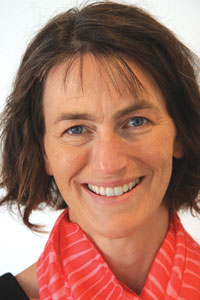Observation
Fredrickson and Other Leading Scientists to Sign Books at the APS Annual Convention
 APS Fellow Barbara L. Fredrickson, University of North Carolina at Chapel Hill, knows how to communicate psychological science to the public. On March 24, her op-ed on electronic devices, social connectedness, and health quickly became the most emailed article on The New York Times website, and it remained among the top 10 most emailed articles for several days. The op-ed was based on a forthcoming paper in Psychological Science in which Frederickson and her colleagues explore social genomics and the profound effects that social connection and social isolation can have on health and gene expression.
APS Fellow Barbara L. Fredrickson, University of North Carolina at Chapel Hill, knows how to communicate psychological science to the public. On March 24, her op-ed on electronic devices, social connectedness, and health quickly became the most emailed article on The New York Times website, and it remained among the top 10 most emailed articles for several days. The op-ed was based on a forthcoming paper in Psychological Science in which Frederickson and her colleagues explore social genomics and the profound effects that social connection and social isolation can have on health and gene expression.
At the 25th APS Annual Convention in Washington, DC, Fredrickson will be signing copies of her 2013 book Love 2.0: How Our Supreme Emotion Affects Everything We Feel, Think, Do, and Become, and her 2009 book Positivity. Fredrickson’s book signing will be held on Saturday, May 25, 9:00 AM–10:20 AM. She is one of several scientists who will be signing copies of their latest books at Convention; the others include Michael S. Gazzaniga, Diane F. Halpern, Scott O. Lilienfeld, Roy F. Baumeister, Daniel Kahneman, Susan T. Fiske, Michael I. Norton, Daniel Willingham, and Geoff Cumming.
Fredrickson will also be chairing the invited symposium “New Frontiers in the Science of Positive Emotions: Brain, Body, and Social Relationships” on Saturday, May 25, 2013, 9:00 AM –10:20 AM, and will be participating in the symposium “Understanding and Promoting Emotional Well-Being” on Friday, May 24, at 1:00 PM–2:20 PM.





APS regularly opens certain online articles for discussion on our website. Effective February 2021, you must be a logged-in APS member to post comments. By posting a comment, you agree to our Community Guidelines and the display of your profile information, including your name and affiliation. Any opinions, findings, conclusions, or recommendations present in article comments are those of the writers and do not necessarily reflect the views of APS or the article’s author. For more information, please see our Community Guidelines.
Please login with your APS account to comment.